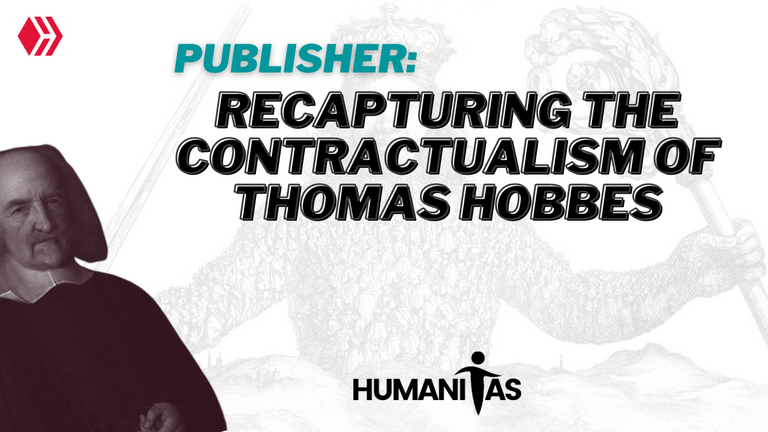Recobrando el contractualismo de Thomas Hobbes
XUz7XKTe5C8YnuydQTvQy7EEVMvjwGZMBNizCZwph5kop31ps63jY31b.png)

ENGLISH
Recapturing the contractualism of Thomas Hobbes

It is never too late to recover the novelty that is in texts that have been written centuries ago, there have been throughout the history of human thought a countless number of characters with unique worldviews that have provided ways of understanding reality, in England, specifically in Westport on April 5, 1588 Thomas Hobbes was born, today remembered and deeply studied for his contribution to philosophical thought in the field of politics and morality.
Thomas Hobbes is at least an interesting character, since he embodies and brings to life the relationship between the social environment or context, as Ortega y Gasset would call it, and the reflective exercise. Since ancient times in philosophy it had been customary to contemplate encyclopedic knowledge in the characters that somehow were authority in the field of knowledge, but in Thomas Hobbes something curious happens, he is one of the first to concentrate energies in a single field, and opens the way to what is known today as specialization. Thus, this English philosopher became an authority and reference in the political field. But, let us return to the issue of context and its relation to the reflective exercise.
It was not by chance that Hobbes thought about the State, but, forced by the warlike circumstances that accompanied him in his life, he realized that one of the worst things that can happen to a civilization is anarchy, so complicated was his political and social context that on one occasion, speaking of himself and his history, Hobbes stated that on the day of his birth, fear had also been born, that is, he considered himself a brother of fear. And it was fear that led him to reflect on the social and try to answer the question that can summarize Hobbes' political thought.
"How can human beings live without causing harm to one another?"
It is no secret to anyone that Hobbes' view towards human beings is a pessimistic one, and the most popular phrase in his work is: "Homo homini lupus" which comes to mean something like man is a wolf to man. So Hobbes sees a reality and a hostile nature among people, but, in the midst of that murky panorama, he visualizes the possibility we have to organize ourselves, to order them politically speaking for the common good beyond individual interests.
And in this lies the core of Thomas Hobbes' political thought, because although he contemplates a hopeless panorama, he glimpses a way of order, but for Hobbes it is not a spontaneous order to which the human being has access, or disposes, but which is reached by means of a contract. For Hobbes all reality was subject to a mechanistic determinism, both in things that for him had no consciousness such as plants and animals, and in the human being who par excellence possesses consciousness, so that the determinism he contemplates is based on the fact that every being seeks the satisfaction of his needs, although strictly speaking, to conceive a scenario with all needs satisfied is highly improbable, not to say impossible.
In this sense, every human being seeks to satisfy his individual needs, but this places us in a state of conflict, since there is no law or rule to guide behavior, and that is why Thomas Hobbes sees the need to create a structure that allows not only the satisfaction of the needs of individuals but also promotes an environment where a life in welfare is achieved, because in the state of nature this is practically impossible. At this point, Hobbes conceives the creation of a state and the analogy he uses to conceive the state is the human body, that is, that the death of the human being to society is war.
But our English thinker is not naive, he knows that an authoritarian state is a monster, but only a monster can fight another monster, which is anarchy, the state in full chaos that plunges people into a situation of death and misery. Hobbes conceives the construction of the state by means of contract, that is, people voluntarily give part of their freedom to the state, so that it can exercise some control over all people. Certainly this procedure has its shortcomings, but it has been the way in which human beings in their history have been able to continue advancing, albeit with a certain precariousness.
For Hobbes, social life arises from the fear that we human beings have of being annihilated, it is true that there are people stronger than others, and perhaps a proto social organization was based on the dominance of the strong, but even the strongest person is vulnerable when he sleeps, and the weakest could stick a knife in him and kill him. That is to say, deep down no one can feel safe at all, so the need to eradicate that fear is born, and to be able to establish a community, which in this sense we can say that a characteristic of a community must be trust among its members.
Each citizen must yield his power to exercise his aggressiveness and place it on the command of a sovereign who is the monopolizer of force and in this way can live with more tranquility in community, but there is a problem, now the fear is transferred to the sovereign who is the one who lays down the law. That is why Hobbes' analogy is a human being, because the social agreement of being able to yield our aggressiveness to a being, is erecting a kind of great character or monster that Hobbes called: Leviathan. Something curious is that Leviathan is a great giant that is made up of human beings, and that in theory it can be said that in this being there is no fear, so that society is a kind of great body and that only the head is the monopolizer of violence.
In conclusion, it must be said that for Hobbes it is logical that the human being wants to overcome every possible circumstance that leads to the war of all against all, but peace can only be achieved as a product of social organization. Hobbes understands that there may be natural ethical desires, but they do not become laws by themselves, they need an external figure to ensure compliance with the law. In other words, life in society is only possible by means of an artifice.
In such an artifice, which we will call "State", there is a pact by means of which all the members of society are obliged to cede the right to govern themselves, so that the state can exercise control and power. Now, we must keep in mind that the pact is not between the ruler and the people, but the pact is between each of the people of society, so that if the ruler breaks the agreement, he must be removed, but on the other hand, the sovereign, being the individual who ensures compliance with the law, is outside his domain, in other words the sovereign is outside the law with which he undertook to comply.
In short, Hobbes' entire political philosophy can be thought of in terms of the phrase: if I must choose between two evils, I must choose the lesser evil. For if the ruler is a despotic and cruel figure, it is no worse than chaos and being at war with everyone.
This reflective exercise has been only a brief approximation to Hobbes' political thought, since there are many more things to be said, and to be thought, but this is only an invitation to Hobbes' thought, which in many aspects is still valid after several centuries of having written these philosophical approaches. Although it is true that today's politics is governed by other principles very different from those of Hobbes, his thought laid the foundations of political philosophy.

Me vino a la mente el siguiente pensamiento: "La política es tarea de todos", en cierta forma veo continuidad con el planteamiento de Hobbes, porque si se trata de darle poder a otra persona o un grupo de ellas, debemos asegurarnos de que sea lo mejor posible, evitando lo peor posible.
!PIZZA
I gifted $PIZZA slices here:
(6/10) @jesusalejos tipped @eudemo (x1)
Send $PIZZA tips in Discord via tip.cc!
The rewards earned on this comment will go directly to the people sharing the post on Twitter as long as they are registered with @poshtoken. Sign up at https://hiveposh.com.
How can human beings live without causing harm to each other?.
There are times when some phrases sound utopian-reiterative. One should never stop writing them, shouting them, evangelizing them or even better, practicing them. They are wise words that speak to us of the peace and harmony that human coexistence offers us as long as we have obedience before the New Covenant proclaimed as the last commandment of Jesus the Christ (according to St. John 15:9-17):
"...As the Father has loved me, so have I loved you; abide in my love. If you keep my commandments, you will abide in my love, just as I have kept my Father's commandments and abide in his love. I have told you this, that my joy may be in you, and that your joy may be full..."
"...that you love one another as I have loved you. Greater love has no one than this, that a man lay down his life for his friends. You are my friends, if you do what I command you. I no longer call you servants, for the servant does not know what his master is doing; but I have called you friends, for all that I have heard from my Father I have made known to you. You have not chosen me, but I have chosen you, and appointed you that you should go and bear fruit, and that your fruit should remain; so that whatever you ask the Father in my name he may give you. What I command you is to love one another..."
Greetings @eudemo and may Our Lord continue to bless you!
¿Cómo pueden vivir los seres humanos sin causarse daño unos a otros?
Hay veces que algunas frases suenan a utopia-reiterativa. No se debería dejar de escribirlas, vociferarlas, evangelzarlas o también, y mejor aún, de prácticarlas. Son palabras sabias que nos hablan de la paz y armonía que nos ofrece la convivencia humana siempre y cuando tengamos obediencia ante la Nueva Alianza proclamada como el ultimo mandamiento de Jesús el Cristo (según San Juan 15,9-17):
"...Como el Padre me amó, yo también os he amado a vosotros; permaneced en mi amor. Si guardáis mis mandamientos, permaneceréis en mi amor, como yo he guardado los mandamientos de mi Padre, y permanezco en su amor. Os he dicho esto, para que mi gozo esté en vosotros, y vuestro gozo sea colmado..."
"...que os améis los unos a los otros como yo os he amado. Nadie tiene mayor amor que el que da su vida por sus amigos. Vosotros sois mis amigos, si hacéis lo que yo os mando. No os llamo ya siervos, porque el siervo no sabe lo que hace su amo; a vosotros os he llamado amigos, porque todo lo que he oído a mi Padre os lo he dado a conocer. No me habéis elegido vosotros a mí, sino que yo os he elegido a vosotros, y os he destinado para que vayáis y deis fruto, y que vuestro fruto permanezca; de modo que todo lo que pidáis al Padre en mi nombre os lo conceda. Lo que os mando es que os améis los unos a los otros..."
Saludos @eudemo y que Nuestro Señor te siga bendiciendo!